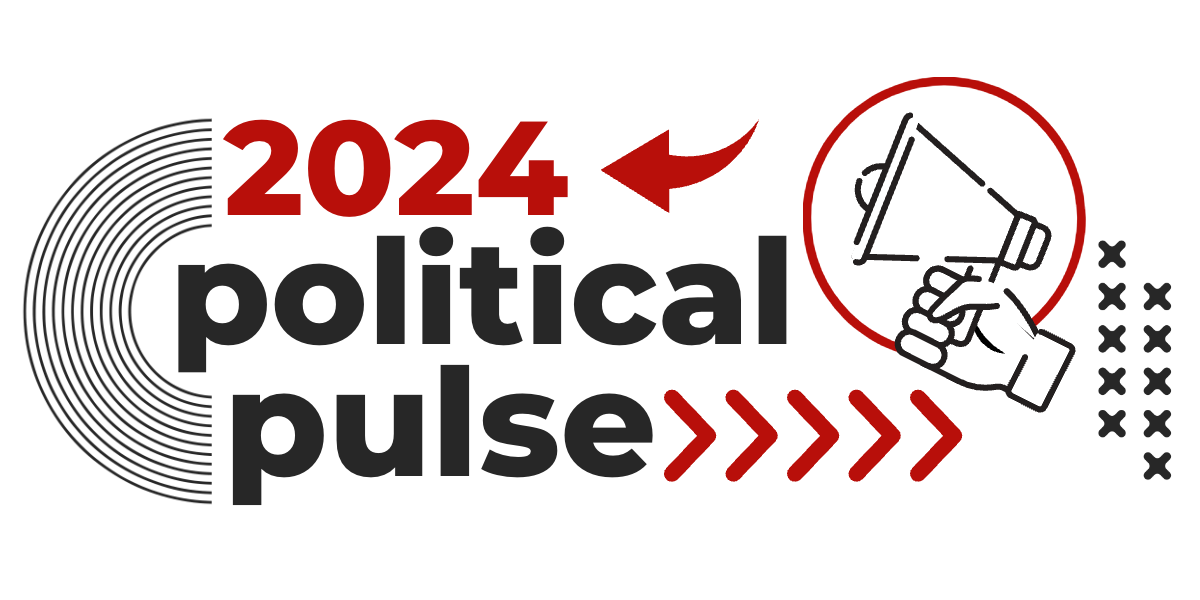DATA POINTS
- 7.49%: The current average 30-year fixed mortgage rate
- 12th: The day in September the iPhone 15 is set to launch
- 62%: The percent of potential Republican primary voters who said Trump has the best chance of beating Biden in the 2024 election
- 99: The age to which Bob Barker from the Price is Right lived
- 125 MPH: Wind speeds with which Hurricane Idalia made landfall in Florida
- 91,648: The world record attendance for a women’s sporting event recorded this week in Memorial Stadium for Nebraska Volleyball
 Can Kamala Calm the Dems?
Can Kamala Calm the Dems?
Democratic leaders across the U.S. are eyeing Vice President Kamala Harris’ seat as doubts rise over her less-than-ideal approval ratings. Are could-be DNC leaders dipping their toes in the water?
Perhaps. California Gov. Gavin Newsom has toured Idaho, Mississippi, Arkansas, and Alabama to campaign for President Biden and Democrats. Pennsylvania Gov. Josh Shapiro will travel to New Hampshire to keynote the state Democratic Party’s convention. Other governors, including Illinois’ J.B. Pritzker, New Jersey’s Phil Murphy, and North Carolina’s Roy Cooper, have all endorsed Biden and played down their presidential ambitions while compiling national networks.
As President Biden approaches his 81st birthday, the big names in Democratic politics understand that if unexpected health concerns plague the president prior to primaries, they may have an opportunity to run against VP Harris in 2024. Despite President Biden’s legislative accomplishments, 77% of Americans and 69% of Democrats say President Biden is too old to serve another four-year term.
Read More at The Wall Street Journal
U.S. State Department Standing Behind Ukrainian Sovereignty
This week, the Biden Administration announced the U.S. will send an additional $250 million worth of weaponry to Ukraine. The payload will be pulled from existing U.S. stockpiles and will include mine-clearing equipment, artillery rounds, ambulances, and medical gear. The State Department provided a list of some totals headed to Europe, including AIM-9M air defense missiles, 155mm and 105mm artillery shells, and more than 3 million small arms rounds. The United States has already provided Ukraine with $43 billion in munitions support since the beginning of Russia’s bloody crusade nearly 18 months ago.
Russia’s pervasive offensive in Ukraine has wide-ranging impacts beyond the two countries’ borders. Russia has attacked Ukraine’s ports and industry infrastructure, which are responsible for shipping grain worldwide, amid a quickly exacerbating global food shortage. While refugees are fleeing Ukraine to escape conflict, people from around the world may migrate from their home countries as silos of food dwindle.
Ukraine holds steadfast as war rages but is reliant on munitions provided by the U.S. The Biden Administration is resolute in supporting the Ukrainian people for as long as they need, and, generally across the U.S., voters back his action. Conservative voters, however, are growing in opposition to federal aid. In May 2022, 17% of GOP voters thought the Biden Administration was doing too much to help Ukraine. Today, 76% of self-described Conservatives oppose further aid.
Read More at The Associated Press
Skip Uber Small Talk with a Robotaxi

Although AVs do not drive drunk, recklessly, or take late-night joy rides, there’s little guidance on the outcomes of the vehicle being pulled over or being involved in an accident. Still, numerous companies who have invested swaths of cash to develop, create, test, and take these vehicles to market see broad implementation as the best way to see a return on investment.
Austin, Phoenix, and San Fransisco are currently the only major U.S. cities hosting unmanned taxis, but that will soon change. GM-owner Cruise announced testing for AVs in 14 new cities across the country.
Telework Telling Tales of Economic Shift

Companies have adapted, but now, so too must the ecosystems that surround office buildings. Happy hours are starting earlier, grocery shopping is happening online, and golf courses are seeing massive waves of tee times during work hours on Wednesdays. Fluid work schedules are changing transportation schedules as the rush hour has been pushed back to start at 9 A.M. This means people are going into the office when they want, not when they must, effectively reducing traffic congestion throughout the day.
Many downtown areas are paying the price of workplace flexibility, and small businesses have experienced far less foot traffic since people do not need to leave their homes or live in the same city as they work. For new and growing small businesses, participating in the e-commerce marketplace will serve as a foothold to surviving the drop in foot traffic.
Read More at The Washington Post
TikTok Influencers Shape School Shopping Sprees

TikTok is pushing college students to go bigger, buy more, and show off to participate in the “silent competition” amongst fellow undergraduates. While TikTok trends are typically grassroots and fluid as teens discover and create new identities for themselves, retailers like Target are enlisting influencers to help boost their sales of espresso machines, air purifiers, monogrammed pillows, and more.
Back-to-college shopping has always been a bellwether for the newest fashion trends. In the early twentieth century, women flocking to universities revolutionized the fashion industry with styles like saddle shoes and Peter Pan-collared shirts. As new trends and fads constantly emerge, retailers are doing their best to keep their finger on the TikTok pulse.
Produce Producing Positive Prescriptions

Reports found that the before-and-after of participants in the “produce protocol” had incredibly positive impacts, especially for patients with high blood pressure. Healthy eating is a considerable factor in reducing and preventing chronic health conditions like obesity, diabetes, heart disease, malnourishment, and high blood pressure. Amid an obesity epidemic, a wave of childhood hunger in the U.S., and high costs of drugs and healthcare, eating more fruits and vegetables could be the key to cracking down on chronic conditions.
Read More at The Washington Post
INTERNATIONAL SPOTLIGHT
Germany’s Economy Needs a New Friend Group
20 years ago, Germany’s manufacturing prowess saw unfettered success. Today, the times are changing. Germany will be the only major economy to contract in 2023, falling behind even sanction-laden Russia, which is experiencing economic growth. Germany’s reliance on manufacturing was a winning bet in years prior, but COVID-era supply chain disruptions, surging energy prices following the Russian aggression in Ukraine, and global inflation have seen a slowdown in their operations. The country’s breakout star, Volkswagen, has faced a downturn amid rising competition from Tesla and Chinese-made EVs. China, serving as a long-standing customer for Germany’s exports, has industrialized to the point where it can produce its supply in-house, becoming a competitor rather than a customer.
Germany’s troubled years of late should be viewed in context; it is the world’s fourth-largest economy, maintains mastery in engineering, experiences strong labor-market reforms to keep citizens employed, and boasts a low national debt.
But Deutschland’s main concern is its growing list of red tape. Germany could position itself as a biotech leader, including running key studies for cancer cures, if it wasn’t for the country’s privacy laws making these projects all but impossible. Another law requires all German manufacturers to vouch for the legal, ethical, and environmental credentials of the entirety of their supply chain, which diminishes the ability of all companies, regardless of size, to coordinate with Chinese firms. This law encourages companies to open new plants in any country besides Germany.
While Germany perseveres as a unique expert in manufacturing and engineering, its bureaucracy and reliance on foreign countries to meet its supply and demand needs are preventing growth.
Read More at The Wall Street Journal
FEATURED TWEET




 Can Kamala Calm the Dems?
Can Kamala Calm the Dems?


